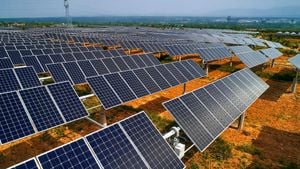The trade relationship between Canada and Mexico is facing new tensions, raising the stakes amid the broader economic dynamics of the United States-Mexico-Canada Agreement (USMCA). Recently, Ontario's Premier Doug Ford expressed serious concerns over what he termed as Mexico's role as a low-tariff "backdoor" for Chinese goods entering the North American market. During his remarks on social media, Ford suggested terminating the USMCA trade pact if Mexico does not align its tariffs on Chinese imports with those of both the U.S. and Canada.
Ford's warnings stem from claims of unfair trade practices, where he accused Mexico of enabling Chinese products, particularly cars and auto parts, to enter Canada and the United States at lower tariff rates. This situation, he argued, jeopardizes the livelihoods of workers on both sides of the border and undermines the economic balance intended by the trade agreement.
His comments arrived shortly after the recent victory of Donald Trump in the presidential election, which is expected to have significant implications for trade negotiations. Ford insinuated the need for new discussions over trade policies, likely nudging toward renegotiation efforts similar to those Trump proposed. “Free trade needs to be fair,” Ford declared, highlighting the disparities imposed by Mexico's tariff structures.
Despite implementing tariffs of 5% to 50% on certain products from China, Mexico's tariffs on several items, including electric vehicles, are reportedly lower than the ones set by Canada and the U.S. Financial experts, including Mexico's Finance Minister Rogelio Ramírez de la O, have indicated the intent to reduce reliance on imports from China. They contend this would stimulate growth, particularly by replacing just one-tenth of those imports with North American goods.
Ford’s rhetoric is not without its consequences as it mirrors broader sentiments within the U.S. government. Just last month, Trump criticized the practice of routing Chinese goods through Mexico to evade U.S. tariffs, emphasizing the necessity for stronger protections against such actions. Ford echoed this sentiment during his press conference, underlining the harm this practice inflicts on American and Canadian workers.
Meanwhile, the concrete ramifications of Ford's statements potentially include bolstered efforts to forge more stringent trade protections, including the push for separate U.S.-Canada agreements if Mexico does not comply with the tariff structures Ford deems necessary for fair competition.
On the other side, Mexican authorities are aware of the rising scrutiny. Mexico imposed various tariffs intended to manage its trade relationship with China and preserve its imports from the country. Recent figures reveal Mexico imports around US $119 billion from China annually, with exports to China sitting at merely $11 billion, indicating something fundamental about the trade imbalance.
Financial analysts and trade experts alike are paying close attention as U.S. representatives have also signaled their apprehensions over the increase of steel and aluminum exports from Mexico—resources often diverted from Chinese markets, raising alarms about circumvention pathways for U.S. tariffs. The trade representatives have called for Mexico to take immediate measures to address the surge of low-cost imports from unreliable sources.
The backdrop of these discussions encompasses the recent economic shifts post-USMCA implementation, which replaced the older NAFTA framework. With the 2026 review of the USMCA approaching, the stakes of these dialogues escalate, and the effects of Ford's remarks could echo through future negotiations involving all North American countries.
Nevertheless, as these tensions surface, both governments will likely attempt to navigate this highly interdependent relationship carefully. It remains to be seen how policymakers will react to these declared intentions and how negotiations will shift accordingly to maintain economic stability within the tripartite agreement of North America.



